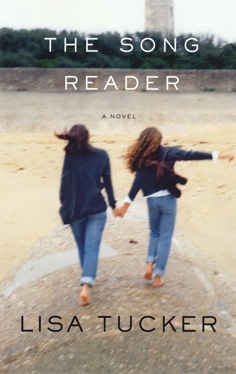

She had to work double shifts at the restaurant to pay for the cards and the answering machine, but she said it was just part of her responsibilities now. "I have a calling in life," she told me, "and I've got to act like it."
I wish I'd saved one of those cards, but I wasn't there the night she buried them at the bottom of the garbage can. It was after Ben left, and after I discovered she'd lied to me about my father. It was when the trouble with Holly Kramer was just beginning, and I still thought -- like most of the town -- that her talent was undeniable.
Some people even claimed she had to be psychic. After all, no one else knew that Rose was in trouble except Mary Beth; no one even suspected that Rose would take Clyde's car on that sun-blind Saturday morning and drive it right over the sidewalk and through the glass wall of his News and Tobacco Mart except my sister, who told Rose two months before that she'd better stop seeing Clyde. From the song chart, Mary Beth knew Clyde had to be bad news. She shook her head when Rose got stuck on "Lucille" for five weeks and warned her a life can't hold this much sadness for long. When Rose started humming "Hungry Heart," Mary Beth knew the lid was about to blow off Rose and Clyde's relationship. But she didn't tell Rose I told you so when we went with Rose's mother to bail her out of jail. She wasn't that way with her advice, not at all.
My sister kept file cards on her customers, "song charts" neatly alphabetized in a large green Rubbermaid box in the corner of our kitchen. On Saturdays she would meet with new customers in the little room downstairs our landlady Agnes had donated to the cause -- as long as Mary Beth kept the room clean and didn't disturb Agnes's husband's sketches and charcoal pencils still sitting on the desk exactly as he left them when he died eighteen years before. Sometimes she gave advice at these first meetings, but usually she waited until she'd kept the chart for at least a few weeks before she gave them a reading.
They were instructed to call twice each week, on Sunday and Wednesday, and leave a short message telling her the songs and the particularly important lines they had hummed for the last few days. She had to rewind the cassette on the Phonemate back to the beginning to fit all the messages that would come in. I helped her update the charts. (It was a lot of work, especially when they reported country and western songs, which I hated.) I wrote down the titles and lines exactly as they said, even if they got it wrong, for what's important, Mary Beth said, is how they hear the words. But if they were off on the lines, we would make a little star on their chart since Mary Beth said they might be hearing them wrong for a reason. We also made an "S" if they'd sung the lines on the machine, and a "C" if they'd sounded like they were crying or struggling not to.
Mary Beth was proud of this organized system. It allowed her to just glance at an entry and know quite a bit. For example, one of the entries on Dorothea Lanigan's chart was the last two lines of "Yesterday." Dorothea had changed only a word and a tense, but Mary Beth had nodded when she looked at the chart later that night and said, "Well, that's that."
Even I thought this one was obvious. After all, the song was about lost love, wasn't it? "It's too bad Dorothea and Wayne are splitting," I said. "She must be miserable."
Mary Beth looked up at me from the floor where she was sitting surrounded by charts and burst out in a laugh. "Leeann, they are going to be engaged by the end of the month. You mark my words." And of course, it turned out to be true. They had their wedding the next summer. Mary Beth was the maid of honor, since Dorothea said it was all thanks to her.
It was a gift, everybody said so. Sometimes I wished I had the gift, too, but I knew I didn't; I'd tried and failed too many times with my friends to believe otherwise. I asked them about their music and I gave them my theories, but I was always way off, and Mary Beth finally told me I was dangerous. "You can't mess around with something like this. What if somebody believes you?"
I knew, though, there was little chance of that. Mary Beth was the kind of person you take seriously; I had never been. Only my sister saw me as the thoughtful, intense person I felt I really was; my friends and acquaintances looked at me as a sweet, happy-go-lucky, go-along-with-anything kind of person. And I knew that was a side of me, too, but I was more comfortable at home, always had been, even though I didn't have parents.
Sure, we were a small family after Mom died, but it wasn't lonely. We had the endless stream of my sister's customers and of course the music. Every day, all day, our stereo would play and Mary Beth would talk about the lyrics, what they really meant. Even when we got Tommy, she kept it up, because she said babies could adjust to noise just fine, as long as you gave them the chance.
When Tommy first came to us, Mary Beth wasn't even all that surprised. She was only twenty-three, but she'd wanted a child as long as she could remember, and she was a big believer in things working out, no matter how improbable the odds. "It was meant to be," she concluded. "It's a sign that I've waited long enough."
At first, I didn't see it that way. I was eleven then; I knew you couldn't just hand over a living, breathing baby as payment for services rendered. Of course Mary Beth insisted Tommy wasn't payment, but I didn't see the distinction. After all, a customer had given him to my sister after the song reading was over, the same way they gave her cakes and stews and afghans and even cash occasionally.
Her name was Linda, but she called herself Chamomile, like the tea. She had a garden of red and purple flowers tattooed on her back, a string of boyfriends back in Los Angeles, and a fourteen-month-old son with big black eyes and curly black hair that she hadn't even bothered to name.
She called him the blob, because she was so sure he was retarded. He couldn't walk or crawl; he didn't talk or coo or even cry much. Nobody wanted that baby: not Linda, not her parents, and not any of the families on Missouri's waiting list for perfect, white infants. Mary Beth took this as another sign that she was supposed to have him. She didn't care if his daddy was black or brown or from Mars, because the first time she picked him up, he held on to her hair with his fist like he was afraid she'd disappear. When she curled up next to him at night, he breathed a fluttering little sigh of what she swore was pure happiness.
Linda was back in Los Angeles and the adoption was already final when the doctor confirmed what Mary Beth had been saying all along: the only thing wrong with Tommy was the way Linda had been treating him. He turned into a chubby-legged toddler who giggled as he followed us all over the apartment. He called me "E-ann" in the sweetest little voice. He called Mary Beth, Mama.
Sometimes I thought Mary Beth's gift would bring us everything.
My sister Mary Beth was a song reader. Nobody else in the whole world can say that, as far as I know. And even after everything that happened, I still find myself wishing I could go back to when the music was like a spirit moving through our town, giving words to what we felt, connecting us all.
Copyright © Lisa Tucker 2003
The Song Reader
First Chapter
My sister Mary Beth was a song reader. Song reading was her term for it and she invented the art as far as I know. It was kind of like palm reading, she said, but instead of using hands, she used music to read people's lives. Their music. The songs that were important to them from as far back as they could remember. The ones they turned up loud on their car radios and found themselves driving a little faster to. The ones they sang in the shower and loved the sound of their own voice singing. And of course, the songs that always made them cry on that one line nobody else even thought was sad.
Her customers adored her. They took her advice -- to marry, to break it off with the low-life jerk, to take the new job, to confront their supervisor with how unfair he was -- and raved about how much better off they were. They said she was gifted. They swore she could see right into their hearts.
From the beginning, my sister took it so seriously. She'd been doing readings less than a month when she had those cards printed up. Each one said in bold black letters:
Mary Beth Norris
Song Reader/Life Healer
Let me help you make sense of the music in your head.
[Family problems a specialty.]
Leave a message at 372-1891. Payment negotiable.








